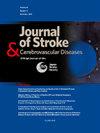Comparative risk of dementia in diabetic stroke patients prescribed SGLT2 vs. DPP-4 inhibitors: A propensity-matched retrospective cohort study
IF 2
4区 医学
Q3 NEUROSCIENCES
Journal of Stroke & Cerebrovascular Diseases
Pub Date : 2025-03-04
DOI:10.1016/j.jstrokecerebrovasdis.2025.108276
引用次数: 0
Abstract
Objective
Diabetes is a significant risk factor for both stroke and dementia. This study aimed to compare the risk of incident dementia between sodium-glucose cotransporter 2 (SGLT2) inhibitors and dipeptidyl peptidase-4 (DPP-4) inhibitors in diabetic patients with a history of ischemic stroke.
Materials
We conducted a propensity-matched retrospective cohort study using observational data from the TriNetX global federated health research network. Patients aged 18 years or older with type 2 diabetes (T2D) and a history of ischemic stroke, newly prescribed either an SGLT2 or DPP-4 inhibitor from July 1, 2013, to June 30, 2024, were included. Propensity score matching was employed to balance baseline characteristics between treatment groups. The primary outcome was incident dementia, with secondary outcomes including degenerative and vascular dementia.
Results
After propensity score matching, each group consisted of 15901 patients. Over a mean follow-up of 2.52 years, SGLT2 inhibitor use was associated with lower risks of overall dementia (hazard ratio [HR] 0.66; 95% confidence interval [CI] 0.59–0.74), degenerative dementia (HR 0.68; 95% CI 0.60–0.76), and vascular dementia (HR 0.59, 95% CI 0.49–0.70) compared to DPP-4 inhibitor use. These findings remained consistent across various sensitivity and subgroup analyses.
Conclusions
In diabetic patients with a history of ischemic stroke, initiating SGLT2 inhibitors, compared to DPP-4 inhibitors, is associated with a lower risk of incident dementia. This association was observed for both degenerative and vascular dementias. These findings support the preferential use of SGLT2 inhibitors in this high-risk population, warranting further investigation through randomized clinical trials.
服用SGLT2与DPP-4抑制剂的糖尿病脑卒中患者痴呆风险的比较:倾向匹配的回顾性队列研究
目的:糖尿病是卒中和痴呆的重要危险因素。本研究旨在比较有缺血性卒中病史的糖尿病患者钠-葡萄糖共转运蛋白2 (SGLT2)抑制剂和二肽基肽酶-4 (DPP-4)抑制剂发生痴呆的风险。材料:我们进行了一项倾向匹配的回顾性队列研究,使用来自TriNetX全球联邦健康研究网络的观察数据。研究纳入了2013年7月1日至2024年6月30日期间新开SGLT2或DPP-4抑制剂的18岁及以上2型糖尿病(T2D)和缺血性卒中病史患者。采用倾向评分匹配来平衡治疗组之间的基线特征。主要结局是偶发性痴呆,次要结局包括退行性痴呆和血管性痴呆。结果:经倾向评分匹配后,每组15901例患者。在平均2.52年的随访中,SGLT2抑制剂的使用与总体痴呆风险降低相关(风险比[HR] 0.66;95%可信区间[CI] 0.59-0.74),退行性痴呆(HR 0.68;(95% CI 0.60-0.76)和血管性痴呆(HR 0.59, 95% CI 0.49-0.70)。这些发现在不同敏感性和亚组分析中保持一致。结论:在有缺血性卒中病史的糖尿病患者中,与DPP-4抑制剂相比,启动SGLT2抑制剂可降低发生痴呆的风险。这种关联在退行性痴呆和血管性痴呆中都被观察到。这些发现支持在高危人群中优先使用SGLT2抑制剂,需要通过随机临床试验进一步研究。
本文章由计算机程序翻译,如有差异,请以英文原文为准。
求助全文
约1分钟内获得全文
求助全文
来源期刊

Journal of Stroke & Cerebrovascular Diseases
Medicine-Surgery
CiteScore
5.00
自引率
4.00%
发文量
583
审稿时长
62 days
期刊介绍:
The Journal of Stroke & Cerebrovascular Diseases publishes original papers on basic and clinical science related to the fields of stroke and cerebrovascular diseases. The Journal also features review articles, controversies, methods and technical notes, selected case reports and other original articles of special nature. Its editorial mission is to focus on prevention and repair of cerebrovascular disease. Clinical papers emphasize medical and surgical aspects of stroke, clinical trials and design, epidemiology, stroke care delivery systems and outcomes, imaging sciences and rehabilitation of stroke. The Journal will be of special interest to specialists involved in caring for patients with cerebrovascular disease, including neurologists, neurosurgeons and cardiologists.
 求助内容:
求助内容: 应助结果提醒方式:
应助结果提醒方式:


